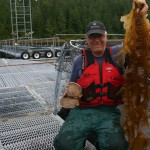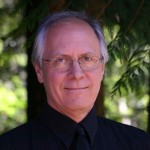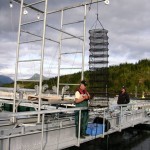SEA VISION – CHANGING THE WAY WE FARM THE OCEANS
SEA VISION – CHANGING THE WAY WE FARM THE OCEANS
University of Victoria scientist Stephen Cross is spearheading a groundbreaking multi-species integrated aquaculture project that could change the way we farm the oceans.
As CEO of SEA Vision Group Inc., Cross is the lead researcher and designer of a pilot aquaculture operation that is licensed for 11 different species, including two varieties of mussels and sea urchins, scallops, oysters, sea cucumbers, sugar kelp, nori and sablefish.

The principle behind the firm’s SEAfood System is surprisingly simple; in essence it mimics ocean ecology but on a micro scale, anchored by the three pillars of social, economic and environmental sustainability. The technology addresses the waste issue associated with conventional finfish aquaculture that can negatively impact the marine environment as it accumulates on the ocean floor. With the SEAfood System, byproduct organics produced from raising sablefish, the farm’s only fed species, nurture a host of other marketable seafood products.
Sablefish, the only commercial species at the farm requiring feed, are raised in open net pens similar, but slightly smaller, to those found on regular fish farms. However that’s where the similarities end.
Nutrient-rich waste that the sablefish produce drifts down through the water column where it is consumed by sea cucumber, a delicacy to the Chinese market yet an animal that in nature helps keep the seafloor clean. Remaining fine organic particles drift downstream where they are intercepted by two tiers of shellfish cultivated on lines, oysters on the upper level and scallops on the lower level, strategically located to account for ocean currents and conditions – shellfish naturally filter the water to extract their food. The dissolved nutrients released by the fish are absorbed by kelp – a natural fertilizer.
All of these marketable species are cultivated in an integrated manner that helps remove the waste associated with fish farming that could otherwise have the potential to negatively affect to the surrounding ocean floor. Simply put, the SEAfood System has turned an ecological negative into a profitable ecological positive.

“If you can remove the waste stream from a fish farm and make money then you’ve got a strong business case,” says Cross.
As the SEA Vision Group scales up its farm to a commercial operation, the company will focus on oysters, scallops, green urchins, sea cucumbers, sugar kelp and sablefish. Already the farm’s specialty smoked sablefish has been tested at a variety of locations and is hoped to become a marquee attraction on restaurant menus around North America. Cross says preliminary sales in Tokyo, Hong Kong and Los Angeles suggest there are distributors who will take all the organic SEAfood he can grow.
Cross and his team have been rigorously testing this innovative aquaculture technology for the past five years. Now they are preparing to ramp the project up from a pilot phase to a full commercial operation with 16 fish pens and the parallel extractive species production.

How you can help:
SEA Vision Group seeks financing to continue testing at its pilot project in Kyuquot Sound and to bring the operation up to full commercial scale. On Sept. 30, 2013 to help meet its initial goal of raising $1.25 million, the company launched a crowd funding campaign on Indiegogo that will last until Nov.29.
To learn more about this crowdfunding campaign and the different levels of financial support possible, go to: igg.me/at/seavision-fundraiser
For more about the SEA Vision Group
